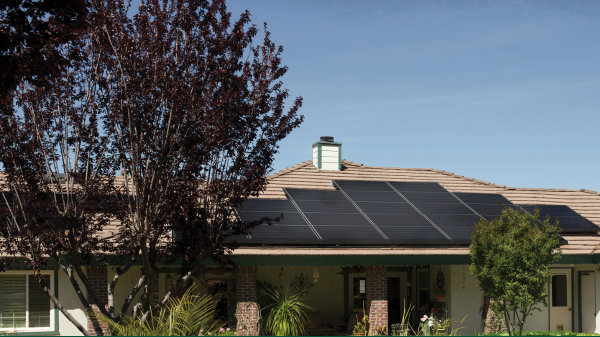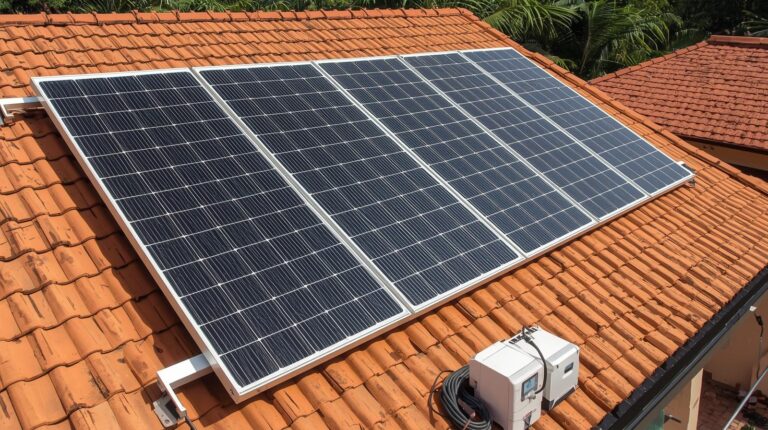In an era where energy independence and sustainability are increasingly important, optimizing home solar energy storage has become essential. To start, accurately calculating your energy needs by analyzing utility bills and peak usage times is key. Next, selecting the right battery, such as lithium-ion, can greatly affect efficiency and lifespan.
Monitoring and maintaining your system guarantees its longevity, while smart management systems can help prioritize energy usage. Finally, understanding time-of-use tariffs can lead to substantial savings. These foundational tips can elevate your solar energy strategy, but there’s more to achieving maximum efficiency and cost-effectiveness.
Calculate Energy Needs
To determine the appropriate capacity for your home solar energy storage system, begin by calculating your average daily energy consumption in kilowatt-hours (kWh). This involves reviewing your utility bills over a period, typically a year, to account for seasonal variations. Record the data meticulously to calculate energy needs accurately.
Next, identify your peak energy usage times, as these periods dictate the highest demand for stored energy. Knowing when these peaks occur helps in planning the size of the storage system to make sure it meets your energy requirements during these critical intervals.
Additionally, consider the efficiency of your solar panels and battery storage system. Solar panels efficiency impacts how much energy is generated, while battery storage system efficiency determines how much of that energy can be stored and later utilized. Both factors are important in estimating the best capacity of your storage system.
A professional consultation is highly recommended to fine-tune these calculations. Experts can provide insights into nuances such as local climate conditions affecting solar panel performance.
Choose Lithium-Ion Batteries
Choosing lithium-ion batteries for home solar energy storage systems guarantees high energy density and longevity, making them a superior choice compared to traditional lead-acid options. Lithium-ion batteries are characterized by their high round-trip efficiency, often exceeding 90%, which translates to minimal energy loss during the charge-discharge cycle. This efficiency is critical for optimizing the performance of residential solar systems, ensuring that a greater proportion of the generated solar energy is effectively stored and utilized.
Moreover, lithium-ion batteries support a deeper depth of discharge (DoD), typically up to 80-90%, allowing homeowners to use more of the stored energy without compromising the battery’s lifespan. This attribute makes them a cost-effective storage solution by maximizing energy utilization and reducing the need for frequent replacements.
The initial investment for a lithium-ion battery system ranges between $10,000 and $15,000, with an average cost of $800 to $1,000 per kilowatt-hour. Considering their high energy density, reliability, and excellent performance metrics, lithium-ion batteries offer a robust and efficient battery system for home solar energy needs. This makes them an ideal choice for those seeking sustainable and economically viable energy storage solutions for residential solar systems.
Related Post: Discover 3 Best Batteries For An Off-Grid Energy System.
Monitor and Maintain System
Effective monitoring and maintenance are paramount to ensuring the best performance and longevity of home solar energy storage systems. Utilizing advanced monitoring software for real-time tracking is essential for maintaining peak system health and energy production. This software enables homeowners to observe energy storage levels and detect any unusual fluctuations, which could indicate potential issues that require immediate attention. Addressing these anomalies promptly can prevent minor problems from escalating into significant malfunctions.
In addition to digital monitoring, regular physical inspections are critical. Homeowners should routinely check for physical damage such as cracks, scratches, or wear that could impair the system’s functionality. Ensuring the system’s physical integrity is essential for maintaining system longevity and consistent performance.
Moreover, we highly recommend scheduling professional inspections. Certified technicians can assess the overall system health and uncover hidden issues that may not be apparent through routine checks or monitoring software alone. These professional evaluations are essential for ensuring the long-term viability and optimal functioning of the solar energy storage system.
Install Smart Management
Implementing a smart management system is essential for optimizing the efficiency and reliability of home solar energy storage solutions. These advanced systems leverage real-time data to monitor and manage energy storage and consumption dynamically. By integrating smart management technology with solar panels and battery storage systems, homeowners can greatly enhance their energy optimization strategies.
Smart management systems prioritize energy usage based on consumption patterns and can guarantee that essential appliances remain operational during power outages. This capability is particularly important for maintaining uninterrupted service and protecting sensitive equipment.
Moreover, by analyzing real-time data, these systems can adjust energy distribution to align with the most efficient usage patterns, thereby maximizing savings and reducing unnecessary energy wastage.
Remote access features empower users to control and monitor their energy systems from anywhere, providing flexibility and convenience. This remote management capability ensures that you can adjust energy consumption on-the-fly based on changing needs and environmental conditions.
Maximize Savings With Tariffs
Leveraging time-of-use tariffs enables homeowners to store surplus solar energy during off-peak hours and utilize it during high-cost peak periods, thereby optimizing cost savings. By implementing an advanced solar battery system, you can exploit these tariffs to effectively reduce dependency on grid electricity when electricity rates are at their peak.
This strategic energy storage approach allows for a significant reduction in energy costs by shifting energy consumption to periods when electricity is less expensive.
Time-of-use tariffs categorize electricity rates based on the time of day, with higher costs during peak hours and lower rates during off-peak hours. By storing solar energy generated during the day, homeowners can avoid consuming grid electricity during high-cost peak hours. This not only maximizes savings but also enhances energy efficiency.
A well-deployed solar battery system facilitates this shift, enabling stored solar energy to be used when it is most financially advantageous.
To maximize savings, it is critical to select the right energy storage solution that aligns with your energy consumption patterns and time-of-use tariffs. By doing so, homeowners can strategically manage their energy usage, reduce reliance on grid electricity, and optimize overall electricity expenditures.
Conclusion
Optimizing home solar energy storage necessitates precise calculation of energy needs, selection of high-density lithium-ion batteries, and diligent system monitoring and maintenance.
The integration of smart management systems is essential for prioritizing energy usage and achieving maximum savings, particularly under time-of-use tariffs.
By adhering to these technical strategies, homeowners can greatly enhance energy independence, reduce operational costs, and contribute to environmental sustainability, thereby achieving a more efficient and economically viable energy solution.




